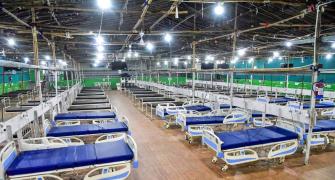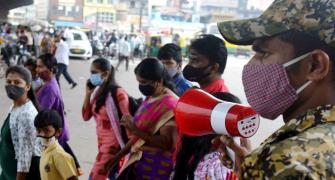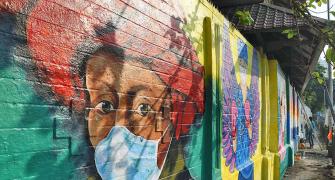India's Omicron COVID count rose to 126 on Saturday after Karnataka and Kerala reported six and four cases respectively, while three more persons in Maharashtra also tested positive for the variant.

According to central and state officials, omicron cases have been detected in 11 states and union territories -- Maharashtra (43), Delhi (22), Rajasthan (17) and Karnataka (14), Telangana (8), Gujarat (7), Kerala (11), Andhra Pradesh (1), Chandigarh (1), Tamil Nadu (1) and West Bengal (1).
Of the six new cases in Karnataka, one is a passenger from the UK, while five others are from COVID-19 clusters in two educational institutions in Dakshina Kannada district, and their travel history or contact with the international travellers are being ascertained, officials said.
"Two cluster outbreaks of COVID have been reported from two educational institutions in Dakshina Kannada today: Cluster 1: 14 cases (of which 4 are Omicron). Cluster 2: 19 cases (1 is Omicron). A traveller from UK has also tested positive for Omicron," Karnataka Health Minister K Sudhakar said in a tweet.
In Kerala, two cases of the new variant of the coronavirus were detected from Thiruvananthapuram in patients aged 17 and 44. One case was detected in Malappuram in a person aged 37 and another was a 49-year-old patient from Thrissur district.
"The 17-year-old patient in Thiruvananthapuram came from the UK while the 44-year-old reached the state from Tunisia in a chartered flight. The patient in Malappuram came from Tanzania while the Thrissur native came from Kenya," health minister Veena George said in a release.
A couple and their 13-year-old daughter have tested positive for the Omicron variant of coronavirus after returning to Satara in western Maharashtra from Uganda, officials said.
Their other daughter, who is five years old, tested positive for COVID-19 but not for the variant.
All four returned to Phaltan in Satara district from the African country on December 9, state health department officials said.
"The husband (35), wife (33) and their elder daughter (13) tested positive for COVID-19 while the report of the younger child was inconclusive, so the samples of all four were sent to the National Institute of Virology for genome sequencing," said Civil Surgeon Dr Subhash Chavan.
The Centre has warned it is likely that the spread of the new variant will outpace the Delta variant where there is community transmission.
It has advised people to avoid non-essential travel and mass gatherings and keep New Year celebrations at low intensity.
While the country's first two cases of the Omicron variant were detected in Karnataka on December 2, this heavily mutated version of the coronavirus was first reported in South Africa on November 24.
The national capital on Saturday recorded 86 fresh COVID-19 cases in a day, the highest in over five months.
On July 8, Delhi had reported 93 coronavirus cases.
The rise in cases is being recorded amid the Omicron scare in Delhi as the total number of patients infected with the latest variant of coronavirus jumped by 12 on Friday to reach 22.
Chief Minister Arvind Kejriwal on Saturday assured the people that his government is ready to tackle the Omicron variant of COVID and advised people not to panic.
Other states too said they were making preparations to deal with a possible rise in Omicron cases.
Odisha has arranged for an adequate number of hospital beds, medical oxygen and medicines to deal with any emergency, state Public Health Director Niranjan Mishra said.
"No one can rule out the possibility of the third wave of COVID-19 with increasing Omicron cases. We are well prepared to tackle the situation," the official said.
Odisha has not recorded any case of the new coronavirus variant so far but neighbouring Andhra Pradesh and West Bengal reported such infections.
The World Health Organization on Saturday stressed on urgent scale-up of public health and social measures to curtail the further spread of the Omicron variant.
Countries can and must prevent the spread of Omicron with proven health and social measures, Regional Director, WHO South-East Asia Region, Poonam Khetrapal Singh said.
"Our focus must continue to be to protect the least protected and those at high risk," she said in a statement.
The overall threat posed by Omicron largely depends on three key questions -- its transmissibility; how well the vaccines and prior SARS-CoV-2 infection protect against it, and how virulent the variant is as compared to other variants.
"From what we know so far, Omicron appears to spread faster than the Delta variant which has been attributed to the surge in cases across the world in the last several months," Singh said.
Emerging data from South Africa suggests an increased risk of re-infection with Omicron, she said, adding that there is still limited data on the clinical severity associated with Omicron.
Further information is needed to fully understand the clinical picture of those infected with Omicron, she said.
Health care capacity including ICU beds, oxygen availability, adequate health care staff and surge capacity need to be reviewed and strengthened at all levels, she stressed.










